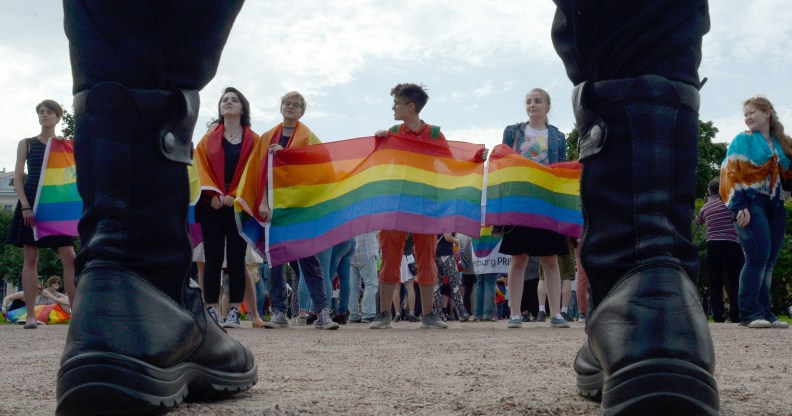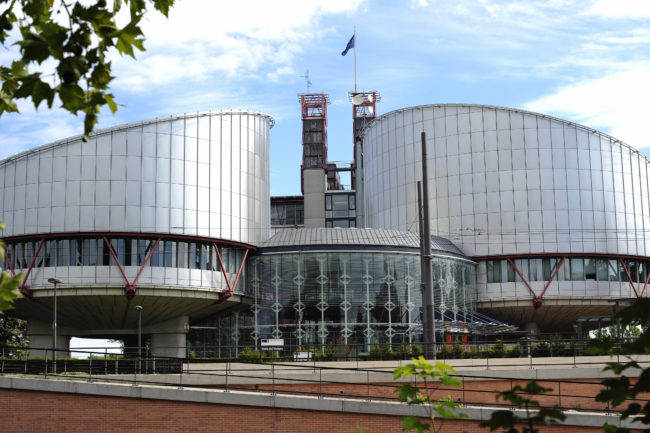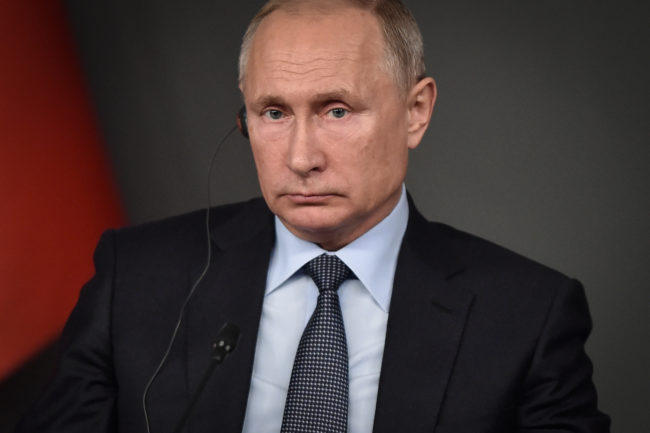Russia’s ban on Pride events breaches human rights, court rules

People wave rainbow flags during a pride rally in Saint Petersburg, on August 12, 2017 as police look on. (OLGA MALTSEVA/AFP/Getty)
Russia has violated LGBT+ people’s human rights by banning Pride events, the European Court of Human Rights has ruled on Tuesday (November 27).
The case was brought by Russian LGBT+ activist Nikolay Alexeyev and six others, who alleged that they have been systemically denied permissions to hold Pride events in cities across Russia. They listed 51 occasions on which permission for events were refused.
Authorities frequently cite the country’s 2013 gay ‘propaganda’ law, which bans “propaganda of non-traditional sexual orientations” in order to block the events, though the denials in the case dated from 2009 to 2014.
“The applicants suffered unjustified discrimination on the grounds of sexual orientation.”
European Court of Human Rights
Ruling against Russia, the court found that “the ban on holding LGBT public assemblies… did not correspond to a pressing social need and was thus not necessary in a democratic society.”
The November 27 ruling also found that “the applicants suffered unjustified discrimination on the grounds of sexual orientation, that that discrimination was incompatible with the standards of the Convention, and that they were denied an effective domestic remedy in respect of their complaints concerning a breach of their freedom of assembly.”

A view taken on August 1, 2010 shows the European Court of Human Rights in Strasbourg. (JOHANNA LEGUERRE/AFP/Getty)
It added that the complainants “suffered unjustified discrimination on the grounds of sexual orientation… incompatible with the standards of the Convention.”
The court ruled that the treatment violated Articles 11 and 14 of the European Convention on Human Rights, which protect freedom of assembly and freedom from discrimination.
Although Russia is a signatory to the European Convention on Human Rights, the international court has little power to enforce the ruling in Russia.
It declined to issue compensation in the case.
Russia human rights breaches
The ECHR has previously ruled that the country’s gay ‘propaganda’ law violates human rights standards.
In June 2017, the court ruled that the law also “reinforced stigma and prejudice and encouraged homophobia.”
The judges concluded that the law breached European treaty rules on freedom of expression.

Russian President Vladimir Putin on October 27, 2018. (OZAN KOSE/AFP/Getty)
“The very purpose of the laws and the way they were formulated and applied in the applicants’ case had been discriminatory and, overall, served no legitimate public interest,” the Strasbourg-based court said.
“Indeed, by adopting such laws, the authorities had reinforced stigma and prejudice and encouraged homophobia, which was incompatible with the values of a democratic society.”
LGBT+ people in Russia face human rights violations
It was alleged in September that Russian police are refusing to investigate extreme homophobic hate speech—because they claim gay people are not a valid social group.
Anna Plyusnina, who is a legal adviser at Yekaterinburg LGBT Resource Centre, alerted the police to extremist messages posted online advocating violent attacks on gay people.
However, anti-extremism police officers told her no action would be taken because the messages were “not addressed to any group of people on the grounds of ethnic, racial, religious, or social identity.”
Polling earlier this year showed that homophobic attitudes have become shockingly prevalent in Russia.
Research carried out by independent Russian polling agency the Levada Center found that 83 percent of respondents consider it “always reprehensible” or “almost always reprehensible” for two adults to have gay sex.
This marks a drastic increase from 1998, when just 68 percent found it unacceptable, and 2008, when 76 percent found it unacceptable.

